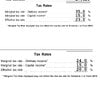- Joined
- Oct 10, 2007
- Messages
- 4,253
- Reaction score
- 7,096
Tremendous eh? I am going to repost what I put above. Explain to me where my math errors are to justify your position for Roth 401 over a pretax. Stop mentioning backdoor Roth it makes no sense at all in this context since it isn't in a 401 but rather an IRA.And what state are you in? That’s the money ball.
If you are in New York City with it’s 11% state/city income tax or California with its 9.25/11.25/13.25% state income tax. Than taking the pretax 401k is better choice since it’s an immediate savings
I get no savings in Florida.
My understanding of the tax code is tremendous and I correct my own accountants and others accountants as well.
20 year horizon
$100 in 401 + $35 in taxable both with 4% returns annually=$219 pre tax (186 after taxes) + $77 ( maybe call it 60 to be generous for taxes) tax free=$246 post tax
Vs
$100 in roth 401 with 4% annually= $219 post tax.
That's approx 12% net difference in free yield.

